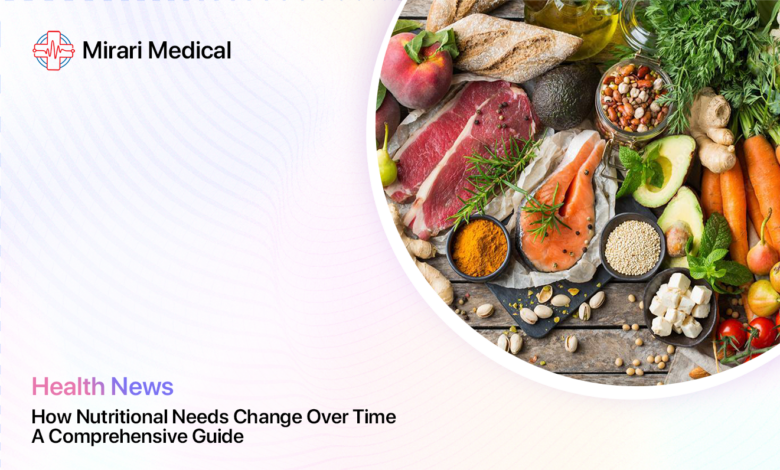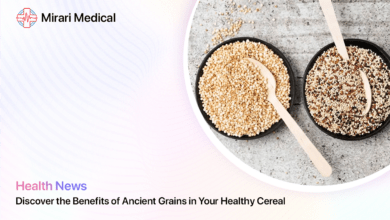How Nutritional Needs Change Over Time: A Comprehensive Guide

You may be interested
Did you know that your body’s nutritional needs are constantly evolving throughout your lifespan? From the rapid growth and development of infancy to the unique challenges of older adulthood, the nutrients your body requires to thrive shift and change with each life stage.
In fact, research shows that over 20% of elderly people suffer from atrophic gastritis, a condition that impairs absorption of key nutrients like vitamin B12, calcium, iron and magnesium[1]. Meanwhile, teenagers need increased calories, protein, calcium and iron to fuel their adolescent growth spurt[5].
Understanding how your nutritional needs transform over time empowers you to make the best dietary choices for lifelong health and wellness. In this in-depth guide, we’ll take you on a journey through the key nutrients needed at every age and stage. You’ll learn practical tips for optimizing your diet from birth to your golden years. Let’s dive in!
Infancy and Early Childhood
The first years of life are marked by rapid growth and development, making nutrition especially crucial during this time. Babies have specific nutrient requirements to support their changing bodies and brains.
What Are the Nutritional Needs of Infants?
For the first 6 months of life, breast milk or infant formula provides all the nutrients a baby needs[2]. Breast milk is the gold standard, offering protective antibodies and the perfect balance of protein, fat, vitamins and minerals. Formula is a suitable alternative if breastfeeding isn’t possible.
As infants start solid foods around 6 months, iron and zinc become important to support growth and brain development. Iron-fortified cereals and pureed meats are great first foods. Babies also need the omega-3 fatty acid DHA found in fatty fish and fortified foods for brain and eye health.
What Are the Nutritional Needs of Toddlers?
Toddlers and preschoolers aged 1-5 need a balanced diet with foods from all the major food groups to get the full array of essential nutrients[5]. Key nutrients include:
- Protein for muscle growth and development
- Calcium and vitamin D for strong bones and teeth
- Iron to prevent anemia and support brain function
- Zinc for growth and immune health
- Fiber for digestive health
Offering a wide variety of colorful fruits, vegetables, whole grains, lean proteins and dairy helps ensure children get the nutrition they need. Limit added sugars and salt to establish healthy eating patterns from a young age.
Adolescence
The teenage years bring another burst of growth and change, along with some special nutritional considerations. Puberty triggers a major growth spurt and sexual maturation, increasing the body’s demand for calories and nutrients.
What Are the Nutritional Needs of Adolescents?
Adolescents have some of the highest nutrient needs of any life stage[3]. To support the growth spurt and bodily changes of puberty, teenagers need more:
- Calories for energy and growth
- Protein for muscle development
- Calcium and vitamin D for the adolescent bone growth spurt
- Iron, especially for girls who have started menstruating
- Zinc for growth, sexual maturation and immune function
The challenge is that many teens have erratic eating habits and gravitate towards nutrient-poor junk foods. Encouraging balanced meals and snacks with plenty of whole foods helps them get the nutrition they need for optimal development.
How Do Nutritional Needs Change During Puberty?
Puberty is triggered by hormonal changes that cause a major adolescent growth spurt around age 10-11 in girls and 12-13 in boys[5]. Nutritional needs increase sharply to fuel this rapid growth and development.
Teenage girls need extra iron due to the onset of menstruation. Adolescent boys require more calories and protein than girls to support their larger body size and muscle mass. The pubertal bone growth spurt also increases the need for bone-building nutrients like calcium, vitamin D, phosphorus and magnesium in both genders.
Puberty is a critical window for laying down peak bone mass and density. Consuming adequate calcium and vitamin D during the teen years helps optimize bone mass, lowering the risk of osteoporosis later in life. Teens need 1300 mg of calcium and 600 IU of vitamin D daily[3].
Adulthood
Once the growth and development of childhood and adolescence is complete, nutritional needs stabilize somewhat during early and middle adulthood. However, there are still some important considerations for this life stage.
What Are the Nutritional Needs of Adults?
Adult nutritional needs vary based on age, sex, height, weight, and activity level. In general, adults require a balanced diet with adequate amounts of[3]:
- Protein for tissue maintenance and repair
- Carbohydrates for energy, with an emphasis on whole grains and fiber
- Healthy fats like omega-3s for heart and brain health
- Vitamins and minerals, especially antioxidants like vitamins A, C and E
- Calcium and vitamin D to maintain bone density, which starts to decline in early adulthood
Men have slightly higher calorie and protein needs than women due to their larger body size. Moderately active adult women need about 2000 calories per day, while moderately active men require around 2400-2600 calories[6].
How Do Nutritional Needs Change During Pregnancy and Breastfeeding?
Pregnancy and breastfeeding significantly increase a woman’s nutrient needs. The developing baby relies on the mother’s nutrient stores, so it’s crucial for pregnant and nursing women to consume a nutrient-dense diet.
During pregnancy, women need[3]:
- An extra 340-450 calories per day in the 2nd and 3rd trimesters
- 60 grams of protein per day
- 1000 mg of calcium per day
- 600 mcg of folate per day to prevent birth defects
- 27 mg of iron per day to support the increased blood volume of pregnancy
- 200 mg of DHA per day for fetal brain development
Breastfeeding women have even higher calorie and nutrient needs than during pregnancy. Nursing mothers should aim for 500 extra calories, 65 grams of protein, 1300 mg of calcium, and 500 mcg of folate daily[3]. Continuing to take a prenatal vitamin and eating foods rich in iron, calcium, and DHA supports both mom and baby’s health.
What Are the Nutritional Needs of Older Adults?
Older adults have unique nutritional challenges and needs. After age 50, people tend to need fewer calories due to decreases in metabolism and lean muscle mass[1]. However, nutrient needs stay the same or even increase for certain vitamins and minerals.
Key nutrients for older adults include[1][4]:
- Protein to prevent muscle loss and sarcopenia
- Calcium and vitamin D to reduce bone loss and fracture risk
- Vitamin B12, which is harder to absorb with age
- Fiber for digestive health and bowel regularity
- Potassium for blood pressure control and heart health
- Healthy fats like omega-3s to lower inflammation
Many older adults have decreased appetite and difficulty chewing, making it harder to get adequate nutrition. Focusing on nutrient-dense foods, taking supplements as needed, and staying physically active helps prevent deficiencies and chronic diseases.
Special Considerations
While the basic principles of a balanced, varied diet apply to everyone, there are some populations with additional nutritional considerations to keep in mind at any life stage.
What Are the Nutritional Needs for Athletes?
Athletes have increased calorie and nutrient needs to fuel their training and optimize performance. Depending on the type and intensity of their sport, athletes may require[3]:
- 500-1000 extra calories per day
- 1.2-2.0 grams of protein per kg of body weight daily
- 6-10 grams of carbohydrate per kg of body weight daily
- Increased fluids and electrolytes like sodium and potassium
- Higher amounts of antioxidants like vitamin C and E to combat exercise-induced oxidative stress
Timing of meals and snacks around workouts is also important for athletes. Eating a mix of protein and carbs within an hour after exercise helps replenish energy stores and promote muscle recovery.
What Are the Nutritional Needs for Vegetarians and Vegans?
Well-planned vegetarian and vegan diets can be nutritionally complete and appropriate for all life stages[3]. However, there are some key nutrients that may be lacking in plant-based diets, including:
- Vitamin B12, found naturally only in animal foods
- Iron, which is less bioavailable from plant sources
- Calcium, especially in vegan diets without dairy
- Omega-3 fatty acids EPA and DHA, found mainly in fatty fish
- Zinc, which is less absorbable from plant foods
Vegetarians and vegans can meet their needs by consuming fortified foods and beverages, taking supplements, and pairing plant proteins like beans and rice to boost amino acid absorption. Including plenty of leafy greens, nuts, seeds, and soy products also helps prevent deficiencies.
How Do Medical Conditions Affect Nutritional Needs?
Certain health conditions and chronic diseases can alter a person’s nutritional needs and require dietary modifications. Some common examples include:
- Diabetes: Requires careful control of carbohydrate intake and an emphasis on high-fiber, low glycemic foods to manage blood sugar.
- Celiac disease: Necessitates strict avoidance of gluten-containing grains like wheat, barley and rye. May increase needs for iron, calcium, and B vitamins due to malabsorption.
- Inflammatory bowel disease: May require a low-fiber or low-residue diet during flares. Increases risk of deficiencies in iron, B12, vitamin D and calcium.
- Food allergies: Require elimination of trigger foods and close attention to reading labels. May need to supplement nutrients found in avoided foods.
- Kidney disease: Often requires restriction of protein, potassium, phosphorus and sodium. May need increased fluids and calcium.
Working closely with a registered dietitian or nutritionist is crucial for those with medical conditions that impact nutritional status. Individualized meal planning helps ensure nutritional needs are met while managing the condition.
Conclusion: The Importance of Meeting Nutritional Needs at Every Stage of Life
Nutrition plays a vital role in growth, development, and disease prevention throughout the lifespan. From the rapid changes of infancy to the unique challenges of older adulthood, understanding how your body’s needs evolve over time allows you to make proactive dietary choices.
While the specifics may change, the basic tenets of a healthy diet remain the same at every age: Eat a variety of nutrient-dense whole foods, limit processed items, and pay attention to your hunger and fullness cues. Combined with regular physical activity, stress management, and adequate sleep, good nutrition lays the foundation for lifelong health and wellness.
If you have questions about your specific nutritional needs, don’t hesitate to consult with your healthcare provider or a registered dietitian. They can help you create an individualized plan that meets your unique needs and preferences. With a little knowledge and planning, you can fuel your body optimally at every life stage.
FAQs
How do nutritional needs change over a lifetime?
Nutritional needs evolve throughout the lifespan based on factors like age, sex, life stage, and activity level. Infants and children require more calories and nutrients per pound to support rapid growth and development. Teenagers have increased needs during puberty. Pregnancy and breastfeeding also raise nutrient needs. Older adults need fewer calories but more of certain nutrients like protein, calcium, and B12.
Do nutritional needs change at different stages of your life?
Yes, nutritional needs change significantly at different life stages. Babies need breast milk or formula, then transition to solid foods. Children require balanced meals for growth and development. Teenagers need extra calories and nutrients for the pubertal growth spurt. Adults have more stable needs, but pregnancy, breastfeeding, and aging bring shifts. Older adults need to focus on nutrient density and preventing deficiencies.
What nutrient needs change as we age?
As we age, calorie needs decrease while protein, calcium, vitamin D, and vitamin B12 needs increase. Older adults need more protein to prevent muscle loss, more calcium and D for bone health, and more B12 due to decreased absorption. Fiber needs also increase to promote bowel regularity. Focusing on nutrient-dense whole foods and taking supplements as needed helps meet changing needs.
How are nutritional needs different for older adults?
Older adults have lower calorie needs but higher requirements for certain nutrients. They need more protein to combat sarcopenia, more calcium and D to reduce bone loss and fracture risk, and more B12 due to impaired absorption. Dehydration is also a concern with aging, so focusing on fluids is key. Nutrient-dense foods and supplements can help prevent deficiencies and chronic diseases.
How does age affect food and nutrition?
Age affects nutrition in several ways. Infants and children need more nutrients for growth, while older adults need fewer calories but more of certain vitamins and minerals. Aging can impair absorption of nutrients like B12 and calcium. Appetite and thirst signals also decrease with age, raising the risk of malnutrition and dehydration. Dental and chewing problems may limit food choices for seniors.
Why does diet change with age?
Diet changes with age for both biological and lifestyle reasons. Metabolic rate and muscle mass decrease over time, lowering calorie needs. Nutrient needs shift due to life stages like pregnancy and aging. Appetite, taste, and smell also diminish in later years. Medications, chronic diseases, and chewing difficulties may necessitate dietary changes for older adults. Adjusting diet with age promotes optimal health.
Key Takeaways
- Nutritional needs change significantly throughout the lifespan based on age, sex, life stage, and activity level.
- Infants, children, and teenagers require more calories and nutrients to support rapid growth and development.
- Pregnancy and breastfeeding increase nutrient needs to nourish both mother and baby.
- Older adults need fewer calories but more protein, calcium, vitamin D, and B12 to prevent muscle loss, bone deterioration, and deficiencies.
- Athletes, vegetarians, and those with medical conditions may have additional nutritional considerations.
- Eating a balanced diet rich in whole foods, taking supplements as needed, and adjusting intake based on life stage helps meet changing nutritional needs.
- Consulting with a healthcare provider or registered dietitian can provide individualized guidance on optimizing nutrition at any age.
References
- https://www.healthline.com/nutrition/nutritional-needs-and-aging
- https://www.betterhealth.vic.gov.au/health/healthyliving/food-and-your-life-stages
- https://nutritionguide.pcrm.org/nutritionguide/view/Nutrition_Guide_for_Clinicians/1342043/all/Nutritional_Requirements_throughout_the_Life_Cycle
- https://www.brownandtoland.com/blog/5-ways-your-nutritional-needs-change-as-you-age-and-what-you-can-do-about-it/
- https://www.eatright.org/food/nutrition/dietary-guidelines-and-myplate/what-your-body-needs-at-every-stage-of-life
- https://www.ncbi.nlm.nih.gov/books/NBK545442/
Your trusted source for health info, offering expert advice, news, and tips to stay healthy and informed.





